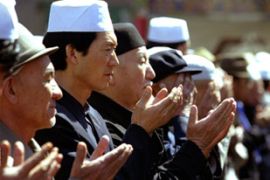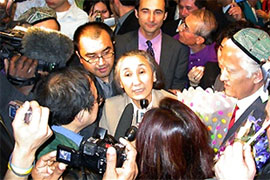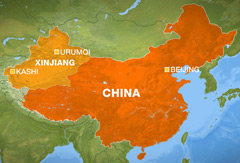China ‘falsified’ terror plots
Alleged “plots” an excuse to crack down on Uighur minority, exiled leader says.

On Sunday Chinese officials announced that they had foiled two alleged plots originating in the vast western region Xinjiang, home of the Muslim Uighur community, but they revealed very few details.
Wang Lequan, the Communist party chief in Xinjiang, said that a January raid on “terrorists” in which two suspects were killed and 15 arrested, had foiled a plan “specifically to sabotage the staging of the Beijing Olympics” in August.
| Xinjiang |
|
Uighurs are Turkic-speaking Muslims with a language and culture distinct from the majority Han Chinese Xinjiang is officially an autonomous region and is rich in natural resources Scattered groups have been fighting for religious freedom and to be treated as a separate entity by the government Beijing cracked down in the 1990s after incidents of riots, bombings and assassinations, but few violent incidents have been reported in recent years |
Officials said the other alleged plot involved passengers attempting to crash a Chinese airliner flying from Urumqi, the capital of Xinjiang, to Beijing on Friday.
The aircraft was diverted to the city of Lanzhou in Gansu province, where “suspicious liquids” were removed, China‘s civil aviation authority said.
But Kadeer said “if there were Uighur separatists on board, the Chinese authorities would have paraded them immediately and punished them severely”.
“It is shameful of the Chinese government,” she said. “The real goal of the Chinese government is to organise a terrorist attack so that it can increase its crackdown on the Uighur people.”
In the 1990s Beijing launched a crackdown on what it said was violent separatist activities in Xinjiang after a series of riots, bombings and assassinations.
Few incidents have been reported in recent years
Commenting on the alleged plots, Wang said the conspirators had been trained by and were following the orders of a separatist group based in Pakistan and Afghanistan called the East Turkestan Islamic Movement (ETIM).
The United Nations and US government have both labelled the group a terrorist organisation, although little is known about its membership and capabilities.
‘Open to question’
 |
| Kadeer, centre, says Beijing wants an excuse to crack down on the Uighurs [Reuters] |
The government’s failure to provide details and evidence has fuelled speculation among human right group that it was overstating the security threat to justify tough measures against opponents.
“When China has made allegations of terrorist activity, it doesn’t back it up with evidence and restrictions make it impossible for independent investigators to verify,” Mark Allison, a Hong Kong-based researcher for Amnesty International, told the Associated Press.
“Without evidence, their claims are open to question,” he said.
Many experts say the threat of a terror attack on the Beijing Games is low and the International Olympic Committee has said it believes “the Chinese authorities are thorough and professional in their handling of security measures and precautions”.
Chinese Olympic organisers themselves voiced confidence about security arrangements on Monday.
“An efficient Olympic security command system is in place,” Sun Weide, a spokesman for the organising committee, said. “We’re confident of holding a peaceful and safe Olympic Games.”
Kadeer, 61, said she was seeking talks with the White House and the US state department about the alleged plots.
She was jailed in 1999 in China for leaking “state secrets” to a US congressional delegation visiting Xinjiang.
After much international pressure she was released in March 2005 and allowed into exile in the United States to join her husband, but two of her sons, aged 32 and 30, remain imprisoned in China.
Beijing has expressed anger about the Uighur leader’s activities while in exile and was incensed when George Bush, the US president, met her in June on the margins of a conference of political dissidents in the Czech Republic.
